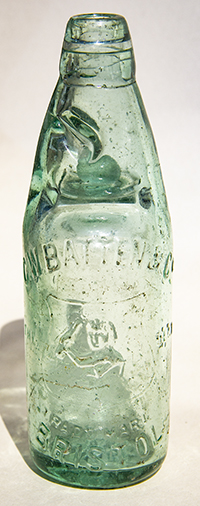
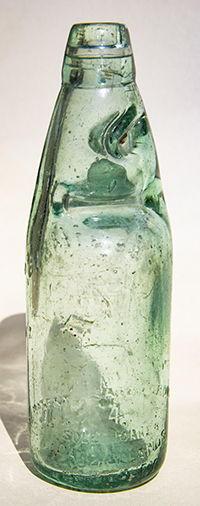
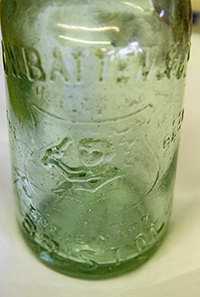
Glassworks: (on reverse) PATENT SAFE GROOVE / 4 / SOLE MAKER / DAN RYLANDS / BARNSLEY.
Charles William Batten was son of Charles William Batten of Batten & Prudencio of Nine Tree Hill, St. Paul's, Aerated Water Manufacturers.
Charles senior married Maria Brown at Bedminster St. John on 1 March 1865. They had son Charles William, baptised at the same church on 12 Aug. 1866. It was this son who went on to set up what would become the Standard Beverage Company.
There was a brother, Frank Farnham Batten, who married Minnie Frances Buckley at St. James, Bristol on 14 Nov. 1893 and was a Mineral Water Manufacturer at the time of his marriage.
Charles William married Lucy Rachel Parsons, who was born in Plymouth, Devon, in 1872, daughter of William and Martha. In 1881 Lucy's family were living in Horfield, and the marriage took place in 1889 in Bristol, the register, however, records Lucy's name as Louisa.
Charles senior died at 120 Cheltenham Road on 21 July 1885.
Charles William Batten was the landlord of the Lamb, West Street, from around January until the 23 November 1887 when the license was transferred to William John Leaker. From the Bristol Magpie - Saturday 29 January 1887 page 16: "...Charlie Batten, of the Lamb Inn, West Street, successfully opened Ye Lambs Smoking Concert. He will be pleased to see his friends any Tuesday Evening at 8 p.m." And from the same issue, page 17: "CHARLIE" BATTEN—LAMB INN, WEST STREET. Importer and Bonder of Wines and Spirits. SPECIALITIES: CHOICE SCOTCH WHISKY. HENNESSEY'S BRANDIES." During his tenure at the Lamb in 1887, Charlie Batten took out a series of advertisements in the Bristol Magpie of a similar nature.
Charles, just 18 and a carpenter by trade when his father died, later attempted to continue in a similar line of business as his father had successfully done, he set up C. W. Batten & Co., Mineral Water Manufacturers, after leaving the Lamb, but was declared bankrupt whilst trading at Brunswick Street, St. Paul’s on 17 October 1888 (Bristol Mercury). Charles, at that time keeper of the Union House beerhouse, All Saints' Street Bristol, had left Bristol at the time of his bankruptcy, believing he'd made a settlement in 1888. He had his own joinery business by 1891 (Charles received the license of the Union House Beerhouse from Samuel Jenkins on 10 July 1889—The license of the beerhouse was transferred to Percy Allen on 4 Dec. 1889).
From the Western Daily Press - Thursday 24 May 1888 page 2: "WANTED, MAN to take charge of Factory. Also BOTTLER.— C. W. Batten and Co., Brunswick Street, Bristol."
From the Bristol Mercury - Saturday 15 September 1888 page 4: "TO PUBLICANS, SHOPKEEPERS, AND OTHERS.—CHARLES BATTEN being no longer in our employ, he is not authorised to transact any business on our behalf. All Persons having Bottles or Cases in their possession belonging to our Firm are requested to send their addresses to enable us to collect the Empties at once.—C. W. BATTEN and CO., Mineral Water Factory, Brunswick Street, City Road."
From the Western Daily Press - Wednesday 17
April 1889: "LOCAL LAW CASE. Court of Appeal, Yesterday.— (Before the
Master of the Rolls and Lords Justices Fry and Lopes.), Mr C. W. BATTEN
EX-PARTS MILNE. Mr Rigby, Q.C., F. C. Willie, and Mr. Wace (instructed by
Mr H. C. Trapnell) appeared for Mr James Milne, the appellant; the
Attorney-General (Sir Richard Webster, Q.C. M.P.), and Mr Muir Mackenzie
(instructed by the Solicitor of the Board of Trade) appeared for the
Offlatal Receiver in the bankruptcy of C. W. Batten, and Mr Herbert Reed
appeared for Messrs Tucker, Veale, and Matthews, the petitioning
creditors, upon whose petition a receiving order, the subject of the
present appeal, was made in the Bristol County Court on the 13th October
last.
It appeared that on the 25th of June last, the bankrupt, C. W. Batten,
executed a deed of assignment to Mr Milne, as a trustee, for the benefit
his creditors, and that this deed was subsequently registered under the
recent Deeds of Arrangement Act. Three of the creditors (the present
respondents) declined to come in under the deed, and on the 24th of
September last presented in the Bristol County Court a joint petition in
bankruptcy against C. W. Batten, grounded the deed as an act of
bankruptcy, and upon this petition receiving order, subsequently an
adjudication in bankruptcy, followed. Mr Milne then appealed against the
proceedings as an aggrieved party, alleging that the debtor was not
indebted to the petitioning creditors in the sum of £50, and that they
had, therefore, no right to present a bankruptcy petition, and this
allegation was ultimately admitted. The appeal came before the Divisional
Court, consisting of Justices Cave and Charles, on the 2nd of February
last, when it was dismissed with costs, on the ground that certain
creditors had signed the schedule to the deed after registration, and that
this subsequent addition constituted a material alteration of the deed and
rendered it void, and that it was also void for non-compliance with Deeds
Arrangement Act. From this decision the trustee, Mr Milne, appealed. The
case came on for hearing on Monday, and the arguments occupied the whole
day and were concluded yesterday.
Mr Rigby, Q.C, contended that deed was duly executed and registered, and
that no subsequent alteration any kind could divest the estate, which then
passed to the trustee. He denied that any alteration had taken place by
reason of the signatures of persons who had a right to sign, and contended
that if a copy the schedule to the deed as it existed at the date of
registration was filed the Act was duly complied with. The creditors could
never tell by looking the deed who had assented to it, as assents might
green without signing the deed; there was, therefore, reason for holding
that schedule, as registered was misleading or incomplete. The learned
counsel cited various authorities as to the true construction of the deed
in question, and urged that the decision of the Divisional Court should be
reversed.
Mr Wace followed on the same side, and argued that the appellant had a locus
standi to appeal.
The Attorney-General opposed the appeal, and, while admitting that the
appellant had a locus standi if his deed were good, contended that
Deeds of Arrangement Act had never been complied with, and that the deed
was accordingly void. The Act contemplated the registration of a complete
deed. It was not intended that the names only of the parties that could be
got together seven days, the period named for registration, should be
registered, and then that the real arrangement whereby the large majority
of the creditors had released their debts should not be registered at all.
Here the registered deeds did not disclose the names of the creditors who
ultimately signed it.
Lord Justice Fry suggested a doubt as to whether the deed in question was
within the Act, owing to its terms.
The Attorney-General replied that, if not, it was a void bill of sale, and
appellant would then have no locus standi. The learned counsel
discussed the clauses of the Act in detail, and argued that the Divisional
Court was right.
Mr Muir Mackenzie followed the same side. The Act required a copy every
schedule "referred to" in the deed to be registered. The schedule
"referred to" by the deed in question was that which now appeared on it,
and no copy of that schedule was registered. The Act was not, therefore,
complied with.
Without calling upon Mr to reply,
The Master of the Rolls held that if the deed in question was valid, the
appellant had a right to appeal, inasmuch as the bankruptcy proceedings
affected his title, and he had a right to say that if the petitioning
creditors were not owed £50 the bankruptcy proceedings were bad and must
be set aside. The Deeds of Arrangement Act required a copy of every deed
within its scope, and a copy of every schedule referred to in such a deed
to be registered within seven days after the execution of the deed by the
debtor or any of his creditors. This deed was duly registered. It was said
that the "copy the schedule" was not filed; but, in order to say whether
this was so or not, regard must be had to the state of the schedule at the
time of registration. If a copy of the schedule as it then existed was
filed, the Act was complied with. Then it was said that the deed was
subsequently materially altered and thereby rendered void. But nothing was
done save the carrying out of the original purpose the deed. The
subsequent signatures of the creditors were a carrying out of, not an
alteration of, the deed. The Act was in no way defeated by the signatures
of the creditors subsequent to registration. They need not have signed the
deed itself.
Lord Justice Fry concurred. It was well-known before the Act that
creditors could come in under a deed of this kind without actually signing
it. Registration of a deed as it existed at the date registration was no
guide to the number of creditors who might assent to it. There was nothing
the Act leading to the view that registration was intended to alter the
practice as to creditor's assents or to disclose who had assented.
Lord Justice Lopes gave judgement to the same affect, and the decision of
the court below was reversed with costs there and in the Court of Appeal,
and a return of the £100 deposited with the Official Receiver pending the
appeal, was ordered. Costs of the shorthand transcript of the judgment of
the divisional court were also allowed. The receiving order and the
adjudication were accordingly set aside."
James Milne was a chartered accountant born in Aberdeen, Scotland, around 1846, at the the time of the court case above, he was living with wife Mary Ann at 45 Chandos Road, Westbury-upon-Trym. His firm was James Milne & Co., Caledonian Chambers, St. Stephen's Avenue, Bristol, Chartered Accountants.
From the London Gazette - 12 July 1889 page 3817: "Batten, Charles William (formerly trading as C. W. Batten and Co.)—Formerly trading at Brunswick-street, City-road, in the city of Bristol, and then residing at 16, City-road aforesaid, subsequently residing at 120, Cheltenham-road, in the city of Bristol, now residing and trading at the Union House Beerhouse, All Saints-street, in the city of Bristol. Formerly Mineral Water Manufacturer, subsequently out of business, now Beer Retailer." The meeting found for Charles on appeal (as above) and the bankruptcy was annulled.
From the Western Daily Press - Thursday 23 May 1889 page 3: "SIR,—Would you kindly permit me a small space in your valuable paper respecting the announcement of my annulment of bankruptcy in your issue of to-day? It stated that present address unknown.'' I wish to state my address as under, where I have lived upwards of one month—previous to that, at Stokes Croft for two months. I am, Sir yours obediently, C. W. BATTEN. " Union House," All Saints' Street, Bristol, May 22nd. 1889."
By 1891 Charles had returned to his former trade of joinery.
From the Bristol Times and Mirror - Thursday 17 September 1891 page 5: "CRUELTY TO CHILDREN. Frederick Daniel Cross and Florence B. Cross, man and wife, were charged with neglecting and ill-treating their children. Mr. Holman Gregory appeared for the male defendant. George Griffin, relieving officer for the parish of St. Paul, said that in consequence of the female defendant applying to him for out-door relief for her four children, he went to the house where they resided, No. 119, Wilder-street. The room in which they lived he found in a most filthy condition, and there was only one bed for them to deep upon. In reply to Mr. Gregory, witness said that the male defendant was employed as a driver by the Standard Beverage Company, and his duties detained him early and late. He earned 40s. a week. Mrs. Cross had been examined by a doctor, who said she was suffering from delirium tremens. Evidence having been given by a neighbour, the magistrates adjourned the case for a month."
Lemuel Williams was born in Ystradgynlais, Swansea, West Glamorgan, in 1844, son of John Williams and Margaretta Davies. In 1861 age 17 he was a clerk to a Coal Works, possibly to his father, who was an employer, Coal Contractor. He married Mary Ann Williams, registered in Bedwellty in 1874 and remained a Clerk to a Colliery until at least 1881, where he and his family can be found at 88 Travalgar Terrace, Ystradyfodwg, Glamorgan. At that date he had 4 daughters, Margaretta (4), Rosalina (3), Dorothy (1) and Mabel (5 months). By 1891 the family were at 32 Drummond Road, Bristol, and they had 2 more children, sons Leonard (6) and Lionel (3). By now Lemuel is working at the Standard Beverage Company.
From the London Gazette - 3 November 1893
page 6162: "LEMUEL WILLIAMS (Deceased)
Persuant to the Statute 22nd and 23rd Vic., cap. 35, intituled "An Act to
further amend the Law of Property, and to relieve Trustees."
NOTICE is hereby given, that all creditors and other persons having any
claims against the estate of Lemuel Williams, late of Fern House,
Brunswick-street, in the city and county of Bristol, trading as the
Standard Beverage Co., Mineral Water Manufacturer, deceased (who died on
the 22nd day of September, 1893, and letters of administration of whose
estate were granted to Mary Anne Williams, of Fern House aforesaid, Widow,
by the Probate Division of Her Majesty's High Court of Justice at Bristol,
on the 25th day of October, 1893), are hereby required to send in
particulars, in writing, of their claims to us, the undersigned,
Solicitors for the said administratrix, on or before the 30th day of
November, 1893; after which date the said administratrix will proceed to
distribute the assets of the said deceased among the parties entitled
thereto, having regard only to the claims of which she shall then have had
notice; and the administratrix will not be accountable for the assets; or
any part thereof, so distributed, to any person of whose debt or claim she
shall not then have had notice.—Dated this 27th day of October, 1893.
PILLERS and PERSHOUSE, Shannon-court, Corn-street, Bristol, Solicitors for
the Administratrix."
After the death of Mr. Williams, the company was acquired by Charles Edward Beavis who installed Alfred Shepherd as manager.
From the Western Daily Press - Wednesday 20 December 1893 page 7: "CHARGE OF EMBEZZLEMENT & FORGERY—Albert Jas. Lewis, a young man, was charged that he, being servant to the Standard Beverage Company, did embezzle and steal sums of money from his employers, also with forging several receipts. Mr Clifton appeared to prosecute, stating that his clients had no desire that the case should be transferred to higher court, but the cases of embezzlement and forgery were closely allied, he asked that the prisoner might be only dealt with on the former charges, so as to come within the jurisdiction of the present court. He would only go into a few of the charges as examples of the many. Alfred Shepherd, manager to Mr Beavis, carrying on business as a mineral water manufacturer, in Brunswick Street, City Road, under the name of the Standard Beverage Co., said the accused was a vanman employed by the company until the 22nd of November, when he was discharged. It was his duty take out goods, receive money, and account for the same to witness as manager. He was furnished with a delivery and receipt-book, of which every alternate sheet was perforated, and by means of a carbon sheet a duplicate copy was thus obtained, the latter being left with the customer. Among the customers was Mrs Miles, of No. 11, Lower Redland Road, who, on the 29th of September, was supplied with goods to the value of 1s. 4d., which money had never been received by the firm. On November 18th the prisoner came back from his rounds, stating that a Mrs Galpin, of Gloucester Road, had been credited with 2s. 8d; a Mrs Garland, of Gloucester Road, was also credited, on November 4th, with goods to value 4s. Altogether the deficit amounted to between 30s. and £2. Mrs Miles was called, and stated that she had paid the accused the amount in question; while Mrs Garland and Mr Galpin denied giving any orders the days in question, or that they owed the firm any money. The prisoner pleaded guilty, and the magistrates, considering the offences part of system, said they could not do less than sentence the accused to a month's imprisonment."
| 10oz Beavis Patent Codd's Bottle | 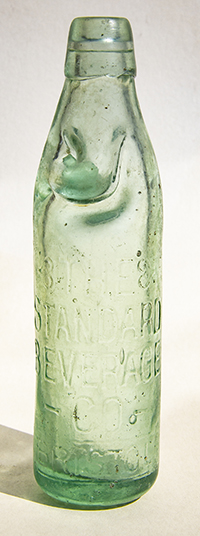 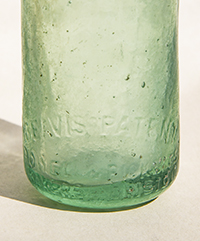 |
| Embossed:
THE (flourish either side) / STANDARD / BEVERAGE / -CO- /
(line) BRISTOL Glassworks: (on reverse) BEAVIS PATENT / POWELL & RICKETTS / MAKERS BRISTOL. Pre-1899 court case. See Beavis. |
| 10oz Beavis Patent Codd's Bottle | 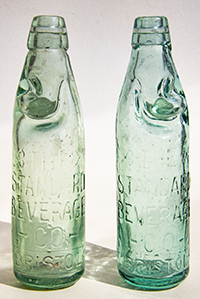 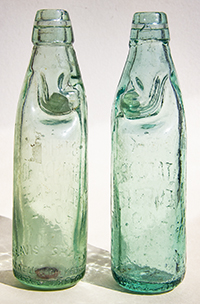 |
| Embossed:
THE (flourish either side) / STANDARD / BEVERAGE / -CO- /
(line) BRISTOL Left and Right hand examples. Glassworks: (on reverse) BEAVIS SHAPE / POWELL & RICKETTS / MAKERS BRISTOL. Post-1899 court case. See Beavis. |